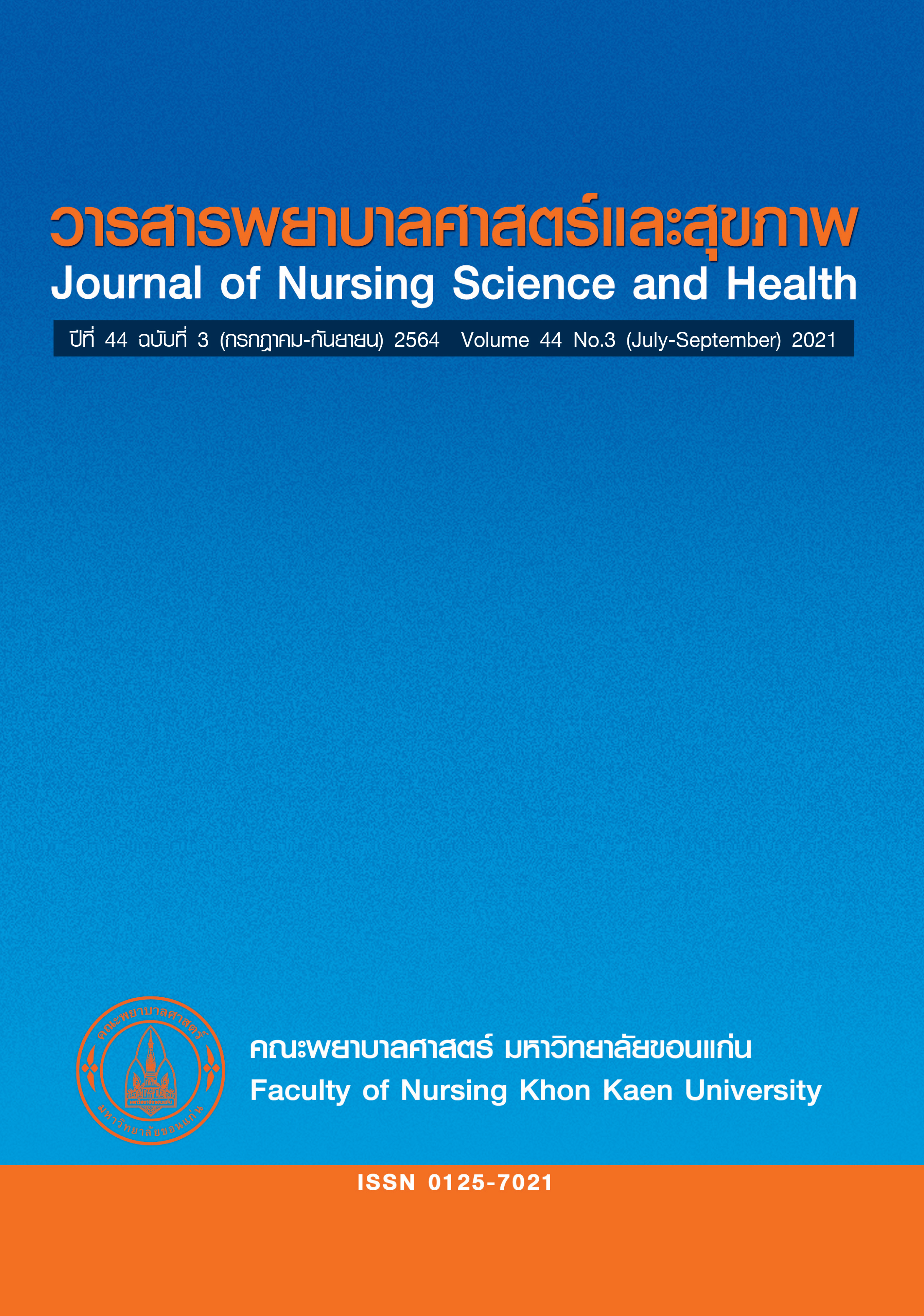บทบาทพยาบาลต่อผู้ป่วยเด็กโรคสมองอักเสบจากภูมิคุ้มกันผิดปกติ
คำสำคัญ:
บทบาทพยาบาล, ผู้ป่วยเด็ก, โรคสมองอักเสบจากภูมิคุ้มกันผิดปกติบทคัดย่อ
โรคสมองอักเสบจากภูมิคุ้มกันผิดปกติ (Anti-N-methyl-D-aspartate (NMDA) receptor encephalitis) เกิดจากความผิดปกติของระบบภูมิคุมกันในร่างกายที่มีการสร้างภูมิคุ้มกันขึ้นมาต่อต้านจำเพาะต่อ NMDA receptor ในสมอง ส่งผลให้มีอาการทางระบบประสาทและมีอาการทางจิตเวชร่วมด้วย ถึงแม้ว่าอุบัติการณ์ของโรคจะพบได้น้อยในเด็ก แต่ลักษณะอาการของโรคมีความซับซ้อนและยากต่อการวินิจฉัยโรค หากเด็กได้รับการวินิจฉัยและการรักษาล่าช้า ส่งผลให้เกิดความผิดปกติในระยะยาว หรือนำไปสู่การเสียชีวิตได้ ซึ่งการรักษาสำหรับโรคนี้มีทั้งระยะเฉียบพลันที่มีอาการแสดงของโรค และระยะยาวสำหรับการฟื้นฟูและการรักษาความผิดปกติที่ยังหลงเหลืออยู่ อีกทั้งเด็กยังจำเป็นต้องได้รับการดูแลอย่างต่อเนื่องเพื่อป้องกันการกลับเป็นซ้ำของโรค ดังนั้นบุคลากรทีมสุขภาพจึงจำเป็นต้องมีความรู้เกี่ยวกับสาเหตุ อาการของโรค แนวทางการักษา เพื่อเตรียมความพร้อมในการดูแลผู้ป่วยเด็กในแต่ละขั้นตอนของการรักษา บทความนี้จึงขอเสนอบทบาทพยาบาลในการดูแลผู้ป่วยเด็กโรคสมองอักเสบจากภูมิคุ้มกันผิดปกติตามแนวทางการปฏิบัติการพยาบาลตามมาตรฐานวิชาชีพ 5 มาตรฐาน ได้แก่ ปฏิบัติการพยาบาลโดยใช้กระบวนการพยาบาล การรักษาสิทธิผู้ป่วย จริยธรรมและจรรยาบรรณวิชาชีพ การพัฒนาคุณภาพการปฏิบัติการพยาบาล การจัดการการดูแลต่อเนื่อง และการบันทึกและรายงานการพยาบาล โดยบทบาทพยาบาลดังกล่าวเป็นส่วนสำคัญที่ช่วยให้พยาบาลสามารถประเมินอาการ ปฏิบัติการพยาบาลและแก้ไขปัญหาสุขภาพของผู้ป่วยได้อย่างครอบคลุมและมีประสิทธิภาพยิ่งขึ้น ส่งผลให้ผู้ป่วยเด็กปลอดภัยและลดภาวะแทรกซ้อนที่อาจเกิดขึ้นจากการดูแลรักษา
เอกสารอ้างอิง
Dalmau J, Tuzun E, Wu HY, Masjuan J, Rossi JE, Voloschin A, et al. Paraneoplastic Anti-N-methyl-D-aspartate receptor encephalitis associated with ovarian teratoma. Ann Neurol 2007;61:25–36.
Dalmau J, Bataller L. Limbic encephalitis: The new cell membrane antigens and a proposal of clinical-immunological classification with therapeutic implications. Neurologia 2007;22(8):526-37.
Titular MJ, McCracken L, Gabilondo I, Armangue T, Glaser C, Lizuka T, et al. Treatment and prognostic factors for long-term outcome in patients with Anti-NMDA receptor encephalitis: An observational cohort study. Lancet Neurol 2013; 12(2):157–65. doi:10.10 16/S1474-4422(12)70310-1.
Weerawan S. Anti-NMDA receptor encephalitis. Epilepsy Digest 2011; 3-5. (in Thai)
Sai Y, Zhang X, Feng M, Tang J, Liao H, Tan L, et al. Clinical diagnosis and treatment of pediatric anti-N-methyl-D-aspartate receptor encephalitis: a single center retrospective study. Exp Ther Med 2018; 16(2):1442-8. doi:10.3892/etm.2018.6329.
Apiwattanakul M. Autoimmune encephalitis. Thai Journal of Neurology 2014; 30(1):1-8. (in Thai)
Remy KE, Custer JW, Cappell J, Foster CB, Garber NA, Walker LK, et al. Pediatric Anti-N-Methyl-d-Aspartate receptor encephalitis: A review with pooled analysis and critical care emphasis. Front Pediatr. 2017 Nov 24; 5:250. doi:10.3389/fped.2017.00250.
Thepwiwatjit S, Jitprapaikulsan J. Anti-NMDA-receptor encephalitis of Thai patients: Description of a consecutive series of patients over 10 Years and a literature review. Journal of the Medical Association of Thailand 2018; 101:163-71. (in Thai)
Thailand Nursing and Midwifery Council. Anual report 2019. Nonthaburi: Suetawan Publishing; 2020.
Bhat P, Ahmed A, Jolepalem P, Sittambalam C. A case report: Anti-NMDA receptor encephalitis. J Community Hosp Intern Med Perspect 2018; 8(3):158-60. doi:10.1080/ 20009666.2018.1481326.
Gable MS, Sheriff H, Dalmau J, Tilley DH, Glaser CA. The frequency of autoimmune n-methyl-d-aspartate receptor encephalitis surpasses that of individual viral etiologies in young individuals enrolled in the California encephalitis project. Clin Infect Dis 2012; 54(7):899–904. doi:10.1093/cid/cir1038.
Kasemsap N, Kongbunkiat K, Tiamkao S. Interesting case: Behavioral change in young women. North-Eastern Thai Journal of Neuroscience 2013;8(2):93-101. (in Thai)
Dalmau J, Lancaster E, Martinez-Hernandez E, Rosenfeld MR, Balice-Gordon R. Clinical experience and laboratory investigations in patients with Anti-NMDAR encephalitis. Lancet Neurol 2011;10(1):63-74. doi:10.1016/S1474-4422(10)70253-2.
Prüss H, Finke C, Höltje M, Hofmann J, Klingbeil C, Probst C, et al. N-methyl-D-aspartate receptor antibodies in herpes simplex encephalitis. Ann Neurol 2012; 72(6):902-11. doi: 10.1002/ana.23689.
Food and drug administration. Rational drug use handbook to special access medicine of national list of essential medicine (E II). Bangkok: The Agricultural Cooperative Federation of Thailand; 2010. (in Thai)
Barry H, Byrne S, Barrett E, Murphy KC, Cotter DR. Anti-N-methyl-d-aspartate receptor encephalitis: review of clinical presentation, diagnosis and treatment. BJPsych Bull 2015;39(1):19-23. doi:10.1192/pb.bp.113.045518.
Kuewong G. The COVID-19: Nursing practice for pediatric patients. Journal of Nursing Sciences & Health 2020;43(4):1-11. (in Thai)
ดาวน์โหลด
เผยแพร่แล้ว
รูปแบบการอ้างอิง
ฉบับ
ประเภทบทความ
สัญญาอนุญาต
ลิขสิทธิ์ (c) 2021 วารสารพยาบาลศาสตร์และสุขภาพ

อนุญาตภายใต้เงื่อนไข Creative Commons Attribution-NonCommercial-NoDerivatives 4.0 International License.
วารสารพยาบาลศาสตร์และสุขภาพเป็นเจ้าของลิขสิทธิ์ในการเผยแพร่ผลงานที่ตีพิมพ์ห้ามผู้ใดนำบทความที่ได้รับการตีพิมพ์ในวารสารพยาบาลศาสตร์และสุขภาพไปเผยแพร่ในลักษณะต่าง ๆ ดังนี้ การนำบทความไปเผยแพร่ออนไลน์ การถ่ายเอกสารบทความเพื่อกิจกรรมที่ไม่ใช่การเรียนการสอน การส่งบทความไปตีพิมพ์เผยแพร่ที่อื่น ยกเว้นเสียแต่ได้รับอนุญาตจากวารสารพยาบาลศาสตร์และสุขภาพ



